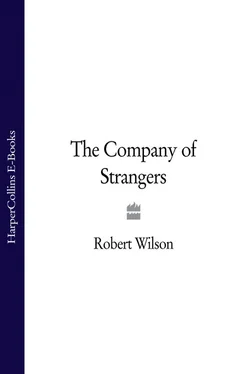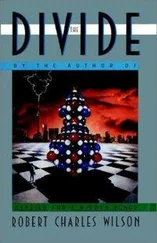‘Not surprised,’ said Wallis, almost miserable.
‘I thought nobody was supposed to know who I am.’
‘They want to, though,’ he said and leaned into her with his lighter.
‘I don’t know what you mean.’
‘You’re beautiful,’ he said, the flame wavering in her face. ‘Simple as that.’
‘Jim,’ she said, warning him.
‘You asked a question.’
‘What are you doing here?’
‘Waiting and watching,’ he said. ‘Do you want to dance…pass the time?’
‘Aren’t you with someone?’
‘She likes roulette,’ said Wallis, holding open his hands to reveal a man with shallow means.
He led Anne to the dance floor. The music started slow. They danced close but formally. She told him about the summerhouse and the covered bower which would make a good place for a dead-letter drop. She’d check it out the next day. The band leader announced a dance number and the couples multiplied on the floor.
She danced for half an hour and went into the powder room when the band took a break. By the time she arrived back at the bar, Wilshere stood on his own with his back to her, foot up on the brass rail, his elbow turned out so that she knew he was still drinking. She told him she wanted to get back to bed. He finished his drink with small ceremony and held out his arm, which she took and they went out into a night that was no cooler.
‘These nights…’ said Wilshere, panting, but without offering anything more, weary of them she could tell.
Wilshere’s pace slowed as they reached the edge of the stone pines near the entrance to the garden. She thought at first that he couldn’t face going back to the house, that smell on him again, which wasn’t fear but like it. He disengaged his arm and put it around her shoulder. They moved on, she supporting him.
The moonlight coaxed the darkness of the garden to blue and Wilshere was staggering and snatching at the fat leaves of the hedge. He was sobbing from such a depth that it came out as a retch, as if he was trying to sick up this thing inside him, some horror tormenting his innards. He hugged her tighter to him. The sharp edges of the jacket stuffed with casino chips cut into her ribs. Anne’s heels ripped over the uneven edges of the cobbled steps. They careened off the path and crashed through the hedge and landed, humped on top of each other, in the soft earth on the other side. Wilshere lay on his back. His face was slack, his breathing regular. She pushed away from his limp embrace and started at the sound of wildlife, large and loud, coming through the foliage. A white shirt front flitted, cuffs reached down to the comatose Wilshere.
‘You’re going to have to help me,’ said the voice in quiet, accented English.
She helped Wilshere over the stranger’s shoulder, chips cascading down his legs. He backed out of the hedge and set off at a steady lope up the lawn. The lights were off inside and outside the house. They went in through the french windows by the terrace.
‘Where does he sleep?’
‘I don’t…I think…just put him in there,’ she said.
The stranger sidestepped into the sitting room, threw Wilshere down on the first sofa and pulled off his shoes. Wilshere struggled with himself and fell silent. She went to the window and opened the shutter which the servants had closed against the morning sunshine. By the time she’d turned back the stranger had gone. Back at the window she saw him cross the moonlit lawn at a calm night-watchman’s pace. He turned at the top of the path to look back, his face obscure. He trotted down the steps, his leather soles pattering the cobbles to silence.
Sunday, 16th July 1944, Wilshere’s house, Estoril, near Lisbon.
In the heat of the morning Anne lay in bed, a crack of light across the foot of the bed warming her ankles. The night’s events crawled through her mind and she understood how quickly adults’ lives could complicate themselves – a compression of thought and action in time, of too much happening in a confined space, of daily need and greed, triumph and disappointment – and how interminably slow a child’s life was, how long the summers used to be with nothing in them. Her mind worked cyclically, coming round to fix on the same single image which had disturbed her even more than Wilshere’s behaviour; the man’s face, his look, intense and intent – inscrutable, too – threatening or benevolent?
She replayed the night to a final tableau in the casino. As she collected Wilshere from the bar Jim Wallis was sitting at his table with a girl. The girl was the song thrush from under the American roulette-player’s arm. She was pretty, in the way of a porcelain doll, if a face that gave out so little could be attractive. It was a hard face that promised but never rewarded. Wallis’s good nature might break itself against that face.
Her dress on the back of the chair was filthy. She recalled the catastrophe in the bushes. Wilshere fighting his way into unconsciousness, desperate to stop living with whatever he had in his mind. She threw on some clothes and ran downstairs barefoot. There was no Wilshere in the silent drawing room where dust motes rolled in the single shaft of light from the one half-opened shutter.
She ran out of the house, across the lawn, hot and rough underfoot, to the cobbled path and down to the bushes which she crashed through to find the soil raked over. The neat furrows twitched with ants. She felt around with her feet and fingers and found a casino chip of the highest denomination: five thousand escudos – fifty pounds. She crossed the path to the summerhouse and the pillared bower whose wooden crossbeams were overgrown with passionflower, its exotic purple and white tropical discs hanging above the stone seat. She placed the casino chip on the top of the left pillar to test her dead-letter drop.
The sun was already grilling her shoulders as she went back up to the house. She broke into a run across the lawn, thudded over the empty terrace and up to the french windows where Wilshere caught her by the arms so suddenly that her feet dangled for a moment. He brushed his thumbs over her hot shoulders, ran his fingers down her arms and off at her elbows so that she shivered.
‘Mafalda doesn’t like running in the house,’ he said, as if this was a rule he’d just made up.
He was dressed as she’d first seen him, in riding gear, and if she expected to see a man dishevelled by his hangover, she was disappointed. He was fresh, perhaps in a way that had taken some work – washing, boiling, starching and ironing – but he was not the man who’d tried to throw himself into hibernation the night before.
‘D’you fancy a ride?’ he asked.
‘You don’t look as if you mean a donkey on the beach.’
‘No-o-o.’
‘Well, that’s just about the upper limit of my riding experience.’
‘I see,’ he said, teasing his moustache up to points with his fingers. ‘It’s a start, I suppose. At least you’ve been aboard an animal before.’
‘I don’t have any clothes…or boots.’
‘The maid’s laid some things out for you on your bed. Try them on. They should fit.’
Back in her room the dirty evening dress had been removed and on the bed were britches, socks, a shirt, a jacket, and boots on the floor. Everything fitted, only the britches were a little short in the leg. She dressed, buttoning the shirt, looking out of the window, thinking that these were not Mafalda’s clothes. They belonged to a young woman. Wilshere came striding back up the cobbled path, whacking his boot with his crop.
She turned, knowing she wasn’t alone in the room. Mafalda stood in the doorway of the bathroom, hair down, wearing the nightdress again, her face shocked and taking in every inch of Anne as if she knew her and couldn’t believe that she’d had the nerve to reappear in her house.
Читать дальше












